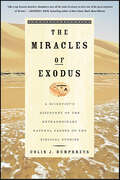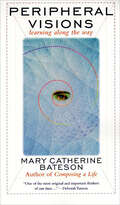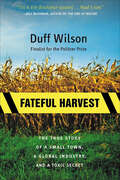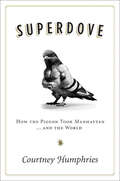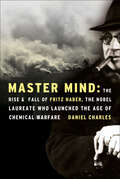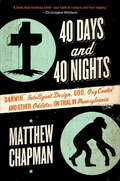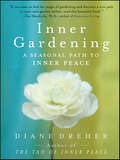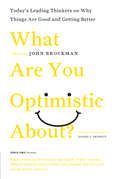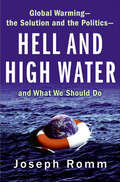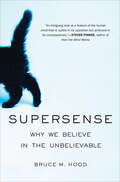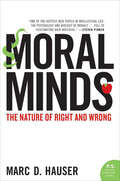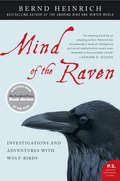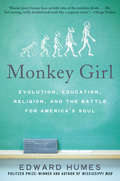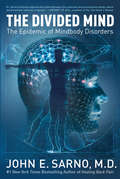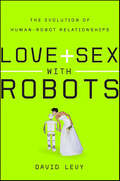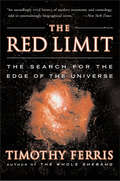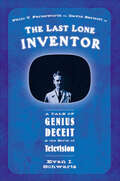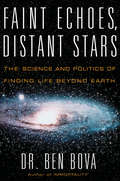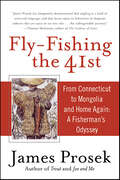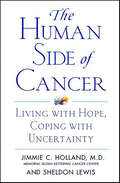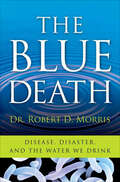- Table View
- List View
The Miracles of Exodus: A Scientist's Discovery of the Extraordinary Natural Causes of the Biblical Stories
by Colin J. HumphreysThe Real Story of the ExodusColin Humphreys, a world-renowned Cambridge University scientist, reveals for the first time the concrete, scientific truth behind the Exodus miracles.The Burning Bush: Caused by a volcanic vent that opened up under the bush.Crossing the Red Sea: The water was pushed back by a very strong wind blowing all night. This is a known physical phenomenon called wind setdown. The details given in the Bible mean we can pinpoint where the Red Sea crossing occurred.Drowning Pharaoh's Army: When the very strong wind suddenly stopped blowing, the water rushed back in the form of a rapidly returning "bore" wave, sweeping Pharaoh's army into the sea.Mount Sinai: The real Mount Sinai is in present-day Saudi Arabia, not the Sinai Desert as is generally assumed.
Peripheral Visions: Learning Along the Way
by Mary C. BatesonMary Catherine Bateson, author of Composing a Life, is our guide on a fascinating intellectual exploration of lifetime learning from experience and encountering the unfamiliar. Peripheral Visions begins with a sacrifice in a Persian garden, moving on to a Philippine village and then to the Sinai desert, and concludes with a description of a tour bus full of Tibetan monks. Bateson's reflections bring theses narratives homes, proposing surprising new vision of our own diverse and changing society and offering us the courage to participate even as we are still learning.
Fateful Harvest: The True Story of a Small Town, a Global Industry, and a Toxic Secret
by Duff WilsonI see soil in a new light, and I wonder about my own lawn and garden. What have I sprinkled on my backyard? Is somebody using my home, my food, to recycle toxic waste? It seems unbelievable, outlandish -- but what if it's true?A riveting expose, Fateful Harvest tells the story of Patty Martin -- the mayor of a small Washington town called Quincy -- who discovers American industries are dumping toxic waste into farmers' fields and home gardens by labeling it "fertilizer." She becomes outraged at the failed crops, sick horses, and rare diseases in her town, as well as the threats to her children's health. Yet, when she blows the whistle on a nationwide problem, Patty Martin is nearly run out of town.Duff Wilson, whose Seattle Times series on this story was a finalist for the Pulitzer Prize, provides the definitive account of a new and alarming environmental scandal. Fateful Harvest is a gripping study of corruption and courage, of recklessness and reckoning. It is a story that speaks to the greatest fears -- and ultimate hope -- in us all.
Superdove: How the Pigeon Took Manhattan ... And the World
by Courtney HumphriesWhy do we see pigeons as lowly urban pests and how did they become such common city dwellers? Courtney Humphries traces the natural history of the pigeon, recounting how these shy birds that once made their homes on the sparse cliffs of sea coasts came to dominate our urban public spaces. While detailing this evolution, Humphries introduces us to synanthropy: The concept that animals can become dependent on humans without ceasing to be wild; they can adapt to the cityscape as if it were a field or a forest.Superdove simultaneously explores the pigeon's cultural transformation, from its life in the dovecotes of ancient Egypt to its service in the trenches of World War I, to its feats within the pigeon-racing societies of today. While the dove is traditionally recognized as a symbol of peace, the pigeon has long inspired a different sort of fetishistic devotion from breeders, eaters, and artists—and from those who recognized and exploited the pigeon's astounding abilities. Because of their fecundity, pigeons were symbols of fertility associated with Aphrodite, while their keen ability to find their way home made them ideal messengers and even pilots. Their usefulness largely forgotten, today's pigeons have become as ubiquitous and reviled as rats. But Superdove reveals something more surprising: By using pigeons for our own purposes, we humans have changed their evolution. And in doing so, we have helped make pigeons the ideal city dwellers they are today. In the tradition of Rats, the book that made its namesake rodents famous, Superdove is the fascinating story of the pigeon's journey from the wild to the city—the home they'll never leave.
Vaccinated
by Paul A. OffitMaurice Hilleman's mother died a day after he was born and his twin sister stillborn. As an adult, he said that he felt he had escaped an appointment with death. He made it his life's work to see that others could do the same. Born into the life of a Montana chicken farmer, Hilleman ran off to the University of Chicago to become a microbiologist, and eventually joined Merck, the pharmaceutical company, to pursue his goal of eliminating childhood disease. Chief among his accomplishments are nine vaccines that practically every child gets, rendering formerly dread diseases-including often devastating ones such as mumps and rubella-practically toothless and nearly forgotten; his measles vaccine alone saves several million lives every year. Vaccinated is not a biography; Hilleman's experience forms the basis for a rich and lively narrative of two hundred years of medical history, ranging across the globe and throughout time to take in a cast of hundreds, all caught up, intentionally or otherwise, in the story of vaccines. It is an inspiring and triumphant tale, but one with a cautionary aspect, as vaccines come under assault from people blaming vaccines for autism and worse. Paul Offit clearly and compellingly rebuts those arguments, and, by demonstrating how much the work of Hilleman and others has gained for humanity, shows us how much we have to lose.
Master Mind: The Rise & Fall of Fritz Haber, the Nobel Laureate Who Launched the Age of Chemical Warfare
by Daniel CharlesFRITZ HABER -- a Nobel laureate in chemistry, a friend of Albert Einstein, a German Jew and World War I hero -- may be the most important scientist you have never heard of. The Haber-Bosch process, which he invented at the turn of the twentieth century, revolutionized agriculture by converting nitrogen to fertilizer in quantities massive enough to feed the world. The invention has become an essential pillar for life on earth; some two billion people on our planet could not survive without it. Yet this same process supplied the German military with explosives during World War I, and Haber orchestrated Germany's use of an entirely new weapon -- poison gas. Eventually, Haber's efforts led to Zyklon B, the gas later used to kill millions -- including Haber's own relatives -- in Nazi concentration camps.Haber is the patron saint of guns and butter, a scientist whose discoveries transformed the way we produce food and fight wars. His legacy is filled with contradictions, as was his personality. For some, he was a benefactor of humanity and devoted friend. For others, he was a war criminal, possessed by raw ambition. An intellectual gunslinger, enamored of technical progress and driven by patriotic devotion to Germany, he was instrumental in the scientific work that inadvertently supported the Nazi cause; a Jew and a German patriot, he was at once an enabler of the Nazi regime and its victim.Master Mind is a thought-provoking biography of this controversial scientist, a modern Faust who personifies the paradox of science, its ability to create and to destroy. It offers a complete chronicle of his tumultuous and ultimately tragic life, from his childhood and rise to prominence in the heady days of the German Empire to his disgrace and exile at the hands of the Nazis; from early decades as the hero who eliminated the threat of starvation to his lingering legacy as a villain whose work led to the demise of millions.
40 Days and 40 Nights: Darwin, Intelligent Design, God, Oxycontin®, and Other Oddities on Trial in Pennsylvania
by Matthew ChapmanIn this fascinating story of evolution, religion, politics, and personalities, Matthew Chapman captures the story behind the headlines in the debate over God and science in America.Kitzmiller v. Dover Board of Education, decided in late 2005, pitted the teaching of intelligent design (sometimes known as "creationism in a lab coat") against the teaching of evolution. Matthew Chapman, the great-great-grandson of Charles Darwin, spent several months covering the trial from beginning to end. Through his in-depth encounters with the participants—creationists, preachers, teachers, scientists on both sides of the issue, lawyers, theologians, the judge, and the eleven parents who resisted the fundamentalist proponents of intelligent design—Chapman tells a sometimes terrifying, often hilarious, and above all moving story of ordinary people doing battle in America over the place of religion and science in modern life.
Inner Gardening: A Seasonal Path to Inner Peace
by Diane DreherWhether you're a first-time gardener or a veteran, you'll find something to inspire you in this beautifully written book that reveals the myriad ways in which working in a garden can enhance your life and deepen your connection to the world.Season by season, Diane Dreher leads you through a journey of peace and renewal. A monthly set of gardening tasks helps you plan, design, and care for your garden, along with illuminating details of gardening history, lore, and tradition. But here you'll also find ways to tend your own inner garden: how to plant seeds of ideas and dreams, weed out bad habits, and design new challenges one step at a time.Brimming with life-enhancing strategies and filled with words of wisdom that will invigorate your spirit, Inner Gardening is a book to treasure and use every day, indoors and out.
What Are You Optimistic About?
by Mr John BrockmanThe nightly news and conventional wisdom tell us that things are bad and getting worse. Yet despite dire predictions, scientists see many good things on the horizon. John Brockman, publisher of Edge (www.edge.org), the influential online salon, recently asked more than 150 high-powered scientific thinkers to answer a vital question for our frequently pessimistic times: "What are you optimistic about?"Spanning a wide range of topics--from string theory to education, from population growth to medicine, and even from global warming to the end of world--What Are You Optimistic About? is an impressive array of what world-class minds (including Nobel Laureates, Pulitzer Prize winners, New York Times bestselling authors, and Harvard professors, among others) have weighed in to offer carefully considered optimistic visions of tomorrow. Their provocative and controversial ideas may rouse skepticism, but they might possibly change our perceptions of humanity's future.
What Are You Optimistic About?
by Mr John BrockmanThe nightly news and conventional wisdom tell us that things are bad and getting worse. Yet despite dire predictions, scientists see many good things on the horizon. John Brockman, publisher of Edge (www.edge.org), the influential online salon, recently asked more than 150 high-powered scientific thinkers to answer a vital question for our frequently pessimistic times: "What are you optimistic about?"Spanning a wide range of topics--from string theory to education, from population growth to medicine, and even from global warming to the end of world--What Are You Optimistic About? is an impressive array of what world-class minds (including Nobel Laureates, Pulitzer Prize winners, New York Times bestselling authors, and Harvard professors, among others) have weighed in to offer carefully considered optimistic visions of tomorrow. Their provocative and controversial ideas may rouse skepticism, but they might possibly change our perceptions of humanity's future.
What Are You Optimistic About?
by John BrockmanThe nightly news and conventional wisdom tell us that things are bad and getting worse. Yet despite dire predictions, scientists see many good things on the horizon. John Brockman, publisher of Edge (www.edge.org), the influential online salon, recently asked more than 150 high-powered scientific thinkers to answer a vital question for our frequently pessimistic times: "What are you optimistic about?" Spanning a wide range of topics-from string theory to education, from population growth to medicine, and even from global warming to the end of world-What Are You Optimistic About? is an impressive array of what world-class minds (including Nobel Laureates, Pulitzer Prize winners, New York Times bestselling authors, and Harvard professors, among others) have weighed in to offer carefully considered optimistic visions of tomorrow. Their provocative and controversial ideas may rouse skepticism, but they might possibly change our perceptions of humanity's future.
Hell and High Water: How Global Warming Will Forever Change
by Joe Romm“Urgent, reasoned, and informative ... America had better listen up--this may be our last chance to stop global warming.” — James Hansen, Director, NASA Goddard Institute for Space Studies
SuperSense: How the Developing Brain Creates Supernatural Beliefs
by Bruce M. HoodThe majority of the world's population is religious or believes in supernatural phenomena. In the United States, nine out of every ten adults believe in God, and a recent Gallup poll found that about three out of four Americans believe in some form of telepathy, déjà vu, ghosts, or past lives. Where does such supernatural thinking come from? Are we indoctrinated by our parents, churches, and media, or do such beliefs originate somewhere else? In SuperSense, award-winning cognitive scientist Bruce M. Hood reveals the science behind our beliefs in the supernatural. Superstitions are common. Many of us cross our fingers, knock on wood, step around black cats, and avoid walking under ladders. John McEnroe refused to step on the white lines of a tennis court between points. Wade Boggs insisted on eating a chicken dinner before every Boston Red Sox game. President Barack Obama played a game of basketball the morning of his victory in the Iowa primary and continued the tradition on every subsequent election day.Supernatural thinking includes loftier beliefs as well, such as the sentimental value we place on photos of loved ones, wedding rings, and teddy bears. It also includes spiritual beliefs and the hope for an afterlife. But in this modern, scientific age, why do we hold on to these behaviors and beliefs?It turns out that belief in things beyond what is rational or natural is common to humans and appears very early in childhood. In fact, according to Hood, this "super sense" is something we're born with to develop and is essential to the way we learn to understand the world. We couldn't live without it!Our minds are designed from the very start to think there are unseen patterns, forces, and essences inhabiting the world, and it is unlikely that any effort to get rid of supernatural beliefs, or the superstitious behaviors that accompany them, will be successful. These common beliefs and sacred values are essential in binding us together as a society because they help us to see ourselves connected to each other at a deeper level.
Moral Minds: The Nature of Right and Wrong
by Marc Hauser“About one of the hottest new topics in intellectual life: the psychology and biology of morals. . . fascinating.” — Steven Pinker, Professor of Psychology, Harvard University, and author of The Language Instinct and How the Mind Works“An account of the nature of the human moral organ . . . a lucid, expert and challenging introduction.” — Noam Chomsky, Professor of Linguistics, MIT“An intellectual feast that provokes thought and should stimulate critical reflection . . . a major contribution to an ongoing debate.” — Peter Singer, Professor of Bioethics, Princeton University“The most complete attempt to bring together philosophy, anthropology, cognitive science and neuroscience... daring and wise.” — Antonio Damasio, Professor of Neuroscience, University of Southern California“The scientific exploration of morality has advanced at a breathtaking pace… [an] enjoyable book.” — Daniel Kahneman, Professor of Psychology and Public Affairs, Princeton University, and 2002 Nobel Laureate in Economics“For a wide audience...a superb overview of one of the hottest topics in the life sciences...a treat.” — Science“An audacious claim about moral thought...highly accessible to a general audience...a deeply significant intellectual contribution.” — Nature“Unlikely to disappoint.” — Nicholas Wade, New York Times“Pathbreaking... relevant to some of the most fundamental contemporary debates in philosophy and public life.” — New York Review of Books
Mind of the Raven: Investigations and Adventures with Wolf-Birds (P. S. Series)
by Bernd HeinrichHeinrich involves us in his quest to get inside the mind of the raven. But as animals can only be spied on by getting quite close, Heinrich adopts ravens, thereby becoming a "raven father," as well as observing them in their natural habitat. He studies their daily routines, and in the process, paints a vivid picture of the ravens' world. At the heart of this book are Heinrich's love and respect for these complex and engaging creatures, and through his keen observation and analysis, we become their intimates too.Heinrich's passion for ravens has led him around the world in his research. Mind of the Raven follows an exotic journey--from New England to Germany, and from Montana to Baffin Island in the high Arctic--offering dazzling accounts of how science works in the field, filtered through the eyes of a passionate observer of nature. Each new discovery and insight into raven behavior is thrilling to read, at once lyrical and scientific.
Monkey GirlEvolution, Education, Religion, and the Battle for America's Soul
by Edward HumesWhat should we teach our children about where we come from? Is evolution a lie or good science? Is it incompatible with faith? Have scientists really detected evidence of a creator in nature? From bestselling, Pulitzer Prize-winning author Edward Humes comes a dramatic story of faith, science, and courage unlike any since the famous Scopes Monkey Trial. Monkey Girl takes you behind the scenes of the recent war on evolution in Dover, Pennsylvania, when the town's school board decision to confront the controversy head-on thrust its students, then the entire community, onto the front lines of America's culture wars. Told from the perspectives of all sides of the battle, it is a riveting true story about an epic court case on the teaching of "intelligent design," and what happens when science and religion collide.
Monkey Girl
by Edward HumesWhat should we teach our children about where we come from? Is evolution a lie or good science? Is it incompatible with faith? Have scientists really detected evidence of a creator in nature? From bestselling, Pulitzer Prize-winning author Edward Humes comes a dramatic story of faith, science, and courage unlike any since the famous Scopes Monkey Trial. Monkey Girl takes you behind the scenes of the recent war on evolution in Dover, Pennsylvania, when the town's school board decision to confront the controversy head-on thrust its students, then the entire community, onto the front lines of America's culture wars. Told from the perspectives of all sides of the battle, it is a riveting true story about an epic court case on the teaching of "intelligent design," and what happens when science and religion collide.
The Divided Mind
by John E. SarnoThe book that will change the way we think about health and illness, The Divided Mind is the crowning achievement of Dr. John E. Sarno's distinguished career as a groundbreaking medical pioneer, going beyond pain to address the entire spectrum of psychosomatic (mindbody) disorders. The interaction between the generally reasonable, rational, ethical, moral conscious mind and the repressed feelings of emotional pain, hurt, sadness, and anger characteristic of the unconscious mind appears to be the basis for mindbody disorders. The Divided Mind traces the history of psychosomatic medicine, including Freud's crucial role, and describes the psychology responsible for the broad range of psychosomatic illness. The failure of medicine's practitioners to recognize and appropriately treat mindbody disorders has produced public health and economic problems of major proportions in the United States. One of the most important aspects of psychosomatic phenomena is that knowledge and awareness of the process clearly have healing powers. Thousands of people have become pain-free simply by reading Dr. Sarno's previous books. How and why this happens is a fascinating story, and is revealed in The Divided Mind.
Love and Sex with Robots: The Evolution of Human-Robot Relationships (Lecture Notes In Computer Science Ser. #10237)
by David LevyLove, marriage, and sex with robots? Not in a million years? Maybe a whole lot sooner!A leading expert in artificial intelligence, David Levy argues that the entities we once deemed cold and mechanical will soon become the objects of real companionship and human desire. He shows how automata have evolved and how human interactions with technology have changed over the years. Levy explores many aspects of human relationships—the reasons we fall in love, why we form emotional attachments to animals and virtual pets, and why these same attachments could extend to love for robots. Levy also examines how society's ideas about what constitutes normal sex have changed—and will continue to change—as sexual technology becomes increasingly sophisticated. Shocking, eye-opening, provocative, and utterly convincing, Love and Sex with Robots is compelling reading for anyone with an open mind.
The Red Limit: The Search for the Edge of the Universe
by Timothy FerrisFor centuries, it was assumed that our universe was static. In the late 1920s, astronomers defeated this assumption with a startling new discovery. From Earth, the light of distant galaxies appeared to be red, meaning that those galaxies were receding from us. This led to the revolutionary realization that the universe is expanding. The Red Limit is the tale of this discovery, its ramifications, and the passionately competitive astronomers who charted the past, present, and future of the cosmos.
The Last Lone Inventor: A Tale of Genius, Deceit, and the Birth of Television
by Evan I. Schwartz“…Fascinating… A riveting American classic of independent brilliance versus corporate arrogance. I found it more fun than fiction.” — James Bradley, author of Flags of Our Fathers“… The fascinating inside story of how this eccentric loner invented television and fought corporate America.” — Walter Isaacson, chariman, CNN“…Compelling…Strong, dramatic prose…” — Kirkus Reviews“…A lively and engaging account.” — Library Journal“[A] gripping and eminently readable saga of the birth of television and the death of the Edisonian myth.” — Darwin magazine
Faint Echoes, Distant Stars: The Science and Politics of Finding Life Beyond Earth
by Ben BovaOur neighboring planets may have the answer to this question. Scientists have already identified ice caps on Mars and what appear to be enormous oceans underneath the ice of Jupiter's moons. The atmosphere on Venus appeared harsh and insupportable of life, composed of a toxic atmosphere and oceans of acid -- until scientists concluded that Earth's atmosphere was eerily similar billions of years ago. An extraterrestrial colony, in some form, may already exist, just awaiting discovery. But the greatest impediment to such an important scientific discovery may not be technological, but political. No scientific endeavor can be launched without a budget, and matters of money are within the arena of politicians. Dr. Ben Bova explores some of the key players and the arguments waged in a debate of both scientific and cultural priorities, showing the emotions, the controversy, and the egos involved in arguably the most important scientific pursuit ever begun.
Fly-Fishing the 41st: From Connecticut to Mongolia and Home Again—A Fisherman's Oddesy
by James Prosek“James Prosek has eloquently demonstrated that angling is a kind of universal language. . . . he has taken us on an unforgettable journey.” — Thomas McGuane, author of The Cadence of Grass and The Longest Silence: A Life in FishingThe New York Times has called James Prosek "the Audubon of the fishing world," and in Fly-Fishing the 41st, he uses his talent for descriptive writing to illuminate an astonishing adventure. Beginning in his hometown of Easton, Connecticut, Prosek circumnavigates the globe along the 41st parallel, traveling through Spain, Greece, Turkey, Armenia, Kyrgyzstan, China, and Japan. Along the way he shares some of the best fishing in the world with a host of wonderfully eccentric and memorable characters.
The Human Side of Cancer: Living with Hope, Coping with Uncertainty
by Sheldon Lewis Jimmie C. HollandFor more than twenty years, Dr. Holland has pioneered the study of psychological problems of cancer patients and their families -- whom she calls "the real experts." In The Human Side of Cancer, she shares what she has learned from all of them about facing this life-threatening illness and what truly helps along the cancer journey. This book is the next best thing to sitting in Dr. Holland's office and talking with her about the uncertainty and anxiety elicited by this disease. And it is a book that inspires hope -- through stories of the simple courage of ordinary people confronting cancer.
The Blue Death: Disease, Disaster, and the Water We Drink
by Robert D. MorrisWith the keen eyes of a scientist and the sensibilities of a seasoned writer, Dr. Robert Morris chronicles the fascinating and at times frightening story of our drinking water. His gripping narrative vividly recounts the epidemics that have shaken cities and nations, the scientists who reached into the invisible and emerged with controversial truths that would save millions of lives, and the economic and political forces that opposed these researchers in a ferocious war of ideas. In the gritty world of nineteenth-century England, amid the ravages of cholera, Morris introduces John Snow, the physician who proved that the deadly disease could be hidden in a drop of water. Decades later in the deserts of Africa, the story follows Louis Pasteur and Robert Koch as they raced to find the cause of cholera and a means to prevent its spread. In the twentieth century, burgeoning cities would subdue cholera and typhoid by bending rivers to their will, building massive filtration plants, and bubbling poisonous gas through their drinking water. However, with the arrival of the new millennium, the demon of waterborne disease is threatening to reemerge, and a growing body of research has linked the chlorine relied on for water treatment with cancer and stillbirths.In The Blue Death, Morris dispels notions of fail-safe water systems. Along the way he reveals some shocking truths: the millions of miles of leaking water mains, constantly evolving microorganisms, and the looming threat of bioterrorism, which may lead to catastrophe. Across time and around the world, this riveting account offers alarming information about the natural and man-made hazards present in the very water we drink.
